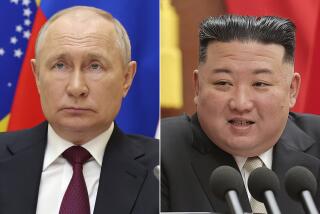U.S. Says It Sees No Increase in Soviet Influence in Iran
- Share via
WASHINGTON — The Reagan Administration, whose concerns about Soviet designs on Iran were cited in President Reagan’s authorization of secret arms sales, said Tuesday that intelligence assessments indicate no increase in Soviet influence in Iran.
However, it was learned, these analyses are based not on any significant changes in Soviet activity but on the recent relative stability in Iranian politics. Although no one suggests that the controversial arms sales that were authorized a year ago contributed to the lack of political turmoil in Iran, the stability has diminished the opportunities for any Soviet threat.
“It all depends on the internal situation,” said one Administration official, speaking on the condition that he not be identified.
Reagan, in authorizing the Iranian arms sales last Jan. 17, signed an intelligence document asserting that Iranian moderates who received military assistance from the United States thus could display “their ability to obtain requisite resources to defend their country against Iraq and intervention by the Soviet Union.”
White House spokesman Larry Speakes said Tuesday that the Soviet threat to Iran “has long been a real one.”
“The seriousness of the threat and probable actions of the Soviet Union could change from time to time, based on circumstances within Iran,” he said.
In the view of U.S. officials, Iran has long held an attraction for the Soviet Union because it offers warm-water ports on the Persian Gulf and ready access to oil fields. Indeed, even before details of the arms sales became known, Administration officials were quietly expressing concern that a recent increase in diplomatic activity between the Soviet Union and Iran could prove troublesome for the United States.
Referring to the political turmoil that appears to rise and fall in Tehran, an Administration official, speaking on the condition of anonymity, said, “In times of flux, there are opportunities for the Soviets.
“Our assessments are continuous, from day to day, month to month,” he said. “The overall assessment of the situation has not changed.”
But, in the Administration view, political unrest, factional fighting or open revolution would give the Soviet Union increased opportunities for subversion or promotion of Iranian Communist factions, if not for overt military operations.
And U.S. officials are particularly concerned about the possibility that the Soviet Union would take advantage of political instability that they believe is likely to accompany the death of the aging Ayatollah Ruhollah Khomeini and shifts in the Iranian leadership.
In the U.S. view, there was no demonstration of such instability over the past year--thus lessening the assessment of Iran’s vulnerability to Soviet actions.
There was no diminishing of the Administration’s perception of Soviet threats, one official said. Rather, there was a belief that “opportunities haven’t presented themselves.”
Another Administration official with access to intelligence assessments pointed out that despite the view that Iran, at the moment, does not appear particularly susceptible to Soviet efforts, “there’s jockeying going on among the mullahs”--the Muslim clerics who form the core of the Iranian political power structure.
“There are factions,” he said. “There’s been backbiting--nothing that is a threat to Khomeini. But after he dies, there’s going to be a lot of arm-wrestling.”
But he added: “I haven’t seen anything that would suggest there’s been a greater degree of Soviet influence.”
At the heart of the struggles among the political leaders, he pointed out, is the future of the Iran-Iraq War, which began more than six years ago. Economic problems are besetting the nation, fuel supplies are running short, Iraq is striking at economic targets and certain rations are running short, he said.
These problems, he said, are leading some mullahs to shift away from the “fight to the death” attitude that has marked the Iranian leadership’s prosecution of the war.
But, he added, despite the indications that some “moderate” elements in the Iranian leadership are demonstrating differences with their colleagues, “I don’t think there’s any acute concern about the Soviets’ leaning on the Iranians” in the short term.
More to Read
Get the L.A. Times Politics newsletter
Deeply reported insights into legislation, politics and policy from Sacramento, Washington and beyond. In your inbox twice per week.
You may occasionally receive promotional content from the Los Angeles Times.










